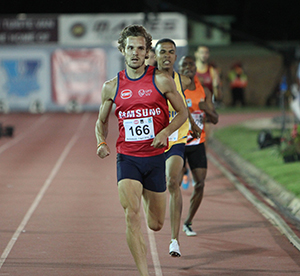Latest News Archive
Please select Category, Year, and then Month to display items
12 October 2020
|
Story Arina Engelbrecht
|
Photo Supplied
 Arina Engelbrecht from Organisational Development and Employee Well-being believes physical activity has a number of benefits for one’s health, including stress relief.
Arina Engelbrecht from Organisational Development and Employee Well-being believes physical activity has a number of benefits for one’s health, including stress relief.
Being physically active plays a big role in preventing the development of mental-health problems and in improving the quality of life of people experiencing mental-health problems.
Treatment for depression
Physical activity can be an alternative treatment for depression. It can be used as a stand-alone treatment or in combination with medication and/or psychological therapy. It promotes all kinds of changes in the brain, including neural growth, reduced inflammation, and new activity patterns are formed that promote feelings of calm and well-being. It releases endorphins – powerful chemicals in the brain that energise your spirit and make you feel good.
Physical activity can be very effective in relieving stress. Research in adults has found that physically active individuals tend to have lower stress levels compared to individuals who are less active. It also leads to improved sleep. When a person sleeps better and feels more rested, overall quality of life improves. They cope better with daily life stressors.
Reduce Alzheimer's risk
Regular physical activity can reduce your risk of developing Alzheimer's disease by up to 50%. It can also slow down further deterioration in those who have already started to develop cognitive problems. It stimulates the brain’s ability to maintain old connections as well as to make new ones.
A study asked people to rate their mood immediately after periods of physical activity (e.g. going for a walk/run, cycling, doing housework) and periods of inactivity (e.g. reading a book or watching television). Researchers found that participants felt more content, more awake, and calmer after being physically active compared to after periods of inactivity.
In conclusion, people who are physically active feel a sense of well-being, feel more energetic throughout the day, sleep better at night, have sharper memories, and feel more relaxed and positive about themselves and their lives.
“Being physically active not only changes your body, it changes your mind,
attitude, and your mood.” – Arina Engelbrecht
Two from UFS heading for Rio
2016-07-18

The 800 m athlete from the University of the
Free State, Rynhardt van Rensburg, will soon
take part in his first Olympic Games in
Rio de Janeiro, Brazil.
Photo: Varsity Sports / Wessel Oosthuizen
It is the cherry on top for any sportsman or sportswoman. This is what DB Prinsloo, Director of KovsieSport, has to say about two athletes from the University of the Free State (UFS) being included in the South African team for the Olympic Games.
He says the officials and coaches at KovsieSport are extremely proud of Rynhardt van Rensburg (800 m) and Wayde van Niekerk (400 m). Although they qualified earlier, their names were read out on 14 July 2016 as part of the team of 137 athletes that will participate in Rio de Janeiro, Brazil, from 5 to 21 August.
In the footsteps of other UFS stars
They follow in the footsteps of former Kovsies like Leslé-Ann George (women’s hockey), Kate Roberts (triathlon), Johan Cronjé (1 500 m), and Frantz Kruger (discus), who represented South Africa at previous Olympics. Apart from these two, four former Kovsies were also included in the team for Rio. They are the Sevens Springbok Philip Snyman, Sevens coach Neil Powell, Chris Dednam as badminton coach and Roberts as team manager of the triathletes. Dednam also competed as a player at the Olympics. Ans Botha, the UFS sprint coach, will also accompany Van Niekerk.
“It is a highlight for any sportsman or sportswoman to be part of the Olympic Games. It is, for example, the same as it is for others to participate in a World Cup,” says Prinsloo.

Wayde van Niekerk
Van Niekerk shows mettle on birthday
Prinsloo is very happy for Van Rensburg, since the 24-year-old athlete has been injured for a long time and had to regain his form. On 24 June 2016, he won a bronze medal at the African Championships in Durban in a time of 1:46.15.
Prinsloo feels that Van Niekerk and Caster Semenya (800 m) are great contenders for medals in Rio. Van Niekerk, who celebrated his 24th birthday on 15 July 2016, continued his good preparation for the Olympics by trouncing his rivals on his birthday at a Diamond League event in Monaco in a time of in 44.12.
“It is a highlight for any sportsman or
sportswoman to be part of the Olympic Games.”